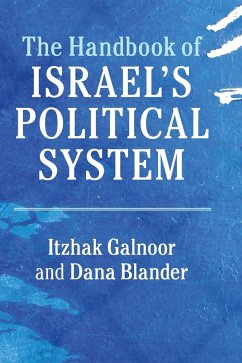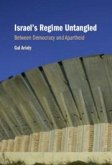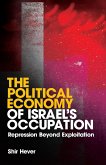- Gebundenes Buch
- Merkliste
- Auf die Merkliste
- Bewerten Bewerten
- Teilen
- Produkt teilen
- Produkterinnerung
- Produkterinnerung
A comprehensive presentation of political life in Israel from the pre-state formative period to the present.
Andere Kunden interessierten sich auch für
![Israel's Regime Untangled Israel's Regime Untangled]() Gal ArielyIsrael's Regime Untangled109,99 €
Gal ArielyIsrael's Regime Untangled109,99 €![The Political Economy of Israel's Occupation The Political Economy of Israel's Occupation]() Shir HeverThe Political Economy of Israel's Occupation40,99 €
Shir HeverThe Political Economy of Israel's Occupation40,99 €![Israel's Higher Law Israel's Higher Law]() Steven V. MazieIsrael's Higher Law165,99 €
Steven V. MazieIsrael's Higher Law165,99 €![The U.S.' and Israel's Securitization of Iran's Nuclear Energy The U.S.' and Israel's Securitization of Iran's Nuclear Energy]() Nassef M. AdiongThe U.S.' and Israel's Securitization of Iran's Nuclear Energy17,95 €
Nassef M. AdiongThe U.S.' and Israel's Securitization of Iran's Nuclear Energy17,95 €![Israel's Colonial Project in Palestine Israel's Colonial Project in Palestine]() Elia ZureikIsrael's Colonial Project in Palestine232,99 €
Elia ZureikIsrael's Colonial Project in Palestine232,99 €![Israel's National Security, the Arab Position, and Its Complicated Relations with the United States Israel's National Security, the Arab Position, and Its Complicated Relations with the United States]() Ehud EilamIsrael's National Security, the Arab Position, and Its Complicated Relations with the United States120,99 €
Ehud EilamIsrael's National Security, the Arab Position, and Its Complicated Relations with the United States120,99 €![Israel's Relations with the East European States Israel's Relations with the East European States]() Yosef GovrinIsrael's Relations with the East European States80,99 €
Yosef GovrinIsrael's Relations with the East European States80,99 €-
-
A comprehensive presentation of political life in Israel from the pre-state formative period to the present.
Hinweis: Dieser Artikel kann nur an eine deutsche Lieferadresse ausgeliefert werden.
Hinweis: Dieser Artikel kann nur an eine deutsche Lieferadresse ausgeliefert werden.
Produktdetails
- Produktdetails
- Verlag: Cambridge University Press
- Seitenzahl: 988
- Erscheinungstermin: 22. März 2019
- Englisch
- Abmessung: 260mm x 183mm x 57mm
- Gewicht: 2014g
- ISBN-13: 9781107097858
- ISBN-10: 1107097851
- Artikelnr.: 51152455
- Herstellerkennzeichnung
- Libri GmbH
- Europaallee 1
- 36244 Bad Hersfeld
- gpsr@libri.de
- Verlag: Cambridge University Press
- Seitenzahl: 988
- Erscheinungstermin: 22. März 2019
- Englisch
- Abmessung: 260mm x 183mm x 57mm
- Gewicht: 2014g
- ISBN-13: 9781107097858
- ISBN-10: 1107097851
- Artikelnr.: 51152455
- Herstellerkennzeichnung
- Libri GmbH
- Europaallee 1
- 36244 Bad Hersfeld
- gpsr@libri.de
Itzhak Galnoor is Herbert Samuel Professor of Political Science (emeritus) at the Hebrew University, Jerusalem, and Academic Director at the Chazan Center at the Van Leer Jerusalem Institute. He has been a Visiting Professor at many international universities, and served on the Executive Committee of the International Political Science Association (IPSA) and edited its Advances in Political Science book series, published by Cambridge University Press. He is the co-author of Privatization Policy in Israel: State Responsibility and the Boundaries of Privatization (2015). In 2015, Galnoor was awarded the Lifetime Achievement Award of the Association of Israel Studies (AIS) and in 2016, The Scholar Achievement Award of the Israel Political Science Association.
Part I. Establishing the State: The Supremacy of Politics: 1. The formative early years of the state (1948-53)
2. Does Israel have a constitution?
Part II. Institutions Matter: 3. The presidency and the symbols of power
4. The Knesset: first among equals?
5. The executive branch and attempts to strengthen it
6. The judiciary's growing involvement in public life
7. Monitoring mechanisms: the state comptroller and state commissions of inquiry
Part III. Political Society: 8. Political participation: have Israeli citizens given up on the political system?
9. Political parties: can we get along without them?
10. Elections: the vague verdict of the Israeli voter
11. Government coalitions: a steering mechanism in the political system
12. Civil society: the third sector that grew unnoticed by the state
13. The media in Israel: do they strengthen or weaken democracy? Part IV. Open Policy Problems: 14. Security reigns supreme
15. Arab citizens of Israel
16. Politics, society, and economics: how did the state provide for the society?
17. Religion and state: between social conflict and political accommodation
Part V. Democracy in Israel: 18. Political culture in Israel.
2. Does Israel have a constitution?
Part II. Institutions Matter: 3. The presidency and the symbols of power
4. The Knesset: first among equals?
5. The executive branch and attempts to strengthen it
6. The judiciary's growing involvement in public life
7. Monitoring mechanisms: the state comptroller and state commissions of inquiry
Part III. Political Society: 8. Political participation: have Israeli citizens given up on the political system?
9. Political parties: can we get along without them?
10. Elections: the vague verdict of the Israeli voter
11. Government coalitions: a steering mechanism in the political system
12. Civil society: the third sector that grew unnoticed by the state
13. The media in Israel: do they strengthen or weaken democracy? Part IV. Open Policy Problems: 14. Security reigns supreme
15. Arab citizens of Israel
16. Politics, society, and economics: how did the state provide for the society?
17. Religion and state: between social conflict and political accommodation
Part V. Democracy in Israel: 18. Political culture in Israel.
Part I. Establishing the State: The Supremacy of Politics: 1. The formative early years of the state (1948-53)
2. Does Israel have a constitution?
Part II. Institutions Matter: 3. The presidency and the symbols of power
4. The Knesset: first among equals?
5. The executive branch and attempts to strengthen it
6. The judiciary's growing involvement in public life
7. Monitoring mechanisms: the state comptroller and state commissions of inquiry
Part III. Political Society: 8. Political participation: have Israeli citizens given up on the political system?
9. Political parties: can we get along without them?
10. Elections: the vague verdict of the Israeli voter
11. Government coalitions: a steering mechanism in the political system
12. Civil society: the third sector that grew unnoticed by the state
13. The media in Israel: do they strengthen or weaken democracy? Part IV. Open Policy Problems: 14. Security reigns supreme
15. Arab citizens of Israel
16. Politics, society, and economics: how did the state provide for the society?
17. Religion and state: between social conflict and political accommodation
Part V. Democracy in Israel: 18. Political culture in Israel.
2. Does Israel have a constitution?
Part II. Institutions Matter: 3. The presidency and the symbols of power
4. The Knesset: first among equals?
5. The executive branch and attempts to strengthen it
6. The judiciary's growing involvement in public life
7. Monitoring mechanisms: the state comptroller and state commissions of inquiry
Part III. Political Society: 8. Political participation: have Israeli citizens given up on the political system?
9. Political parties: can we get along without them?
10. Elections: the vague verdict of the Israeli voter
11. Government coalitions: a steering mechanism in the political system
12. Civil society: the third sector that grew unnoticed by the state
13. The media in Israel: do they strengthen or weaken democracy? Part IV. Open Policy Problems: 14. Security reigns supreme
15. Arab citizens of Israel
16. Politics, society, and economics: how did the state provide for the society?
17. Religion and state: between social conflict and political accommodation
Part V. Democracy in Israel: 18. Political culture in Israel.








